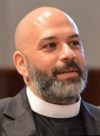- Charbel Zgheib, an ELCA pastor, and Hakim Shukair, an Episcopal priest, have collaborated on creating Arabic-language worship resources.
- Zgheib and Shukair (pictured in vestments at left and right, respectively) lead a joint Arabic-language service at Mother of the Savior Church in Dearborn, Mich.
Editor’s note: This post was originally published on the ELCA Worship Blog.
Our faith is shaped by our prayer. For Arabic-speaking Christians in the ELCA and The Episcopal Church, worshiping in their native language deepens this connection. As the number of Arabic speakers in the U.S. grows, creating a meaningful Arabic liturgy has become more than a translation task—it’s a vital step toward honoring and empowering faith communities.
The power of language in worship
When Christian immigrants in the United States pray in their native languages, they engage with their faith at a deeper level, allowing worship to resonate in personal and culturally relevant ways. Arabic has become one of the most widely spoken languages in the United States, with over 1.4 million people speaking Arabic at home, according to Pew Research. Recognizing this, leaders in the Episcopalian and Lutheran traditions saw the importance of translating liturgy into Arabic. This translation ensures that Arabic-speaking members can pray, learn and connect in a language that speaks directly to their hearts.
The art and challenge of faithful translation
Effective translation of liturgical texts is more than word-for-word substitution. Literal translations can feel rigid or unnatural, often failing to capture the original essence of the prayers and rituals. Collaborating with Arabic-speaking translators with theological backgrounds and editors who understand church language helped ensure that these translations are not only accurate but also spiritually meaningful.
The main resources used for translation were The Episcopal Church’s Book of Common Prayer and Evangelical Lutheran Worship, particularly focusing on the eucharist, which is central to both traditions. This careful approach aimed to bring the richness of these texts to life for Arabic-speaking worshipers, crafting liturgical resources that feel at home in their cultural and linguistic contexts.
A tangible outcome: Arabic resources for worship
The work resulted in essential Arabic-language resources for significant parts of Christian life and worship. These include:
- “Seasonal Bulletins and Feast Days,” liturgical bulletins for different seasons of the Church year and key festivals/feasts.
- “Life Passages: Liturgies for Baptism, Marriage, and Funerals,” foundational rites in the Christian journey.
These resources are currently used by two Arabic-speaking communities within the Episcopal and Lutheran churches, Salam Arabic Church in Brooklyn, N.Y., and Mother of the Savior Church in Dearborn, Mich. For these communities, having an Arabic liturgy is not only a means of worship but a message that their culture and language are valued within their churches.
Building bridges through language
By investing in Arabic liturgical resources, the ELCA and The Episcopal Church demonstrate a commitment to cultural inclusivity. For Arabic-speaking members, this work communicates a sense of belonging and acknowledgment that their mother tongue, traditions and identity are respected and integrated into the fabric of worship. This liturgical translation project fosters unity, bridges cultures and makes the church a welcoming home for all, no matter their native language.
In this way, the Arabic-speaking communities not only receive spiritual nourishment but also find a voice within the broader church.








